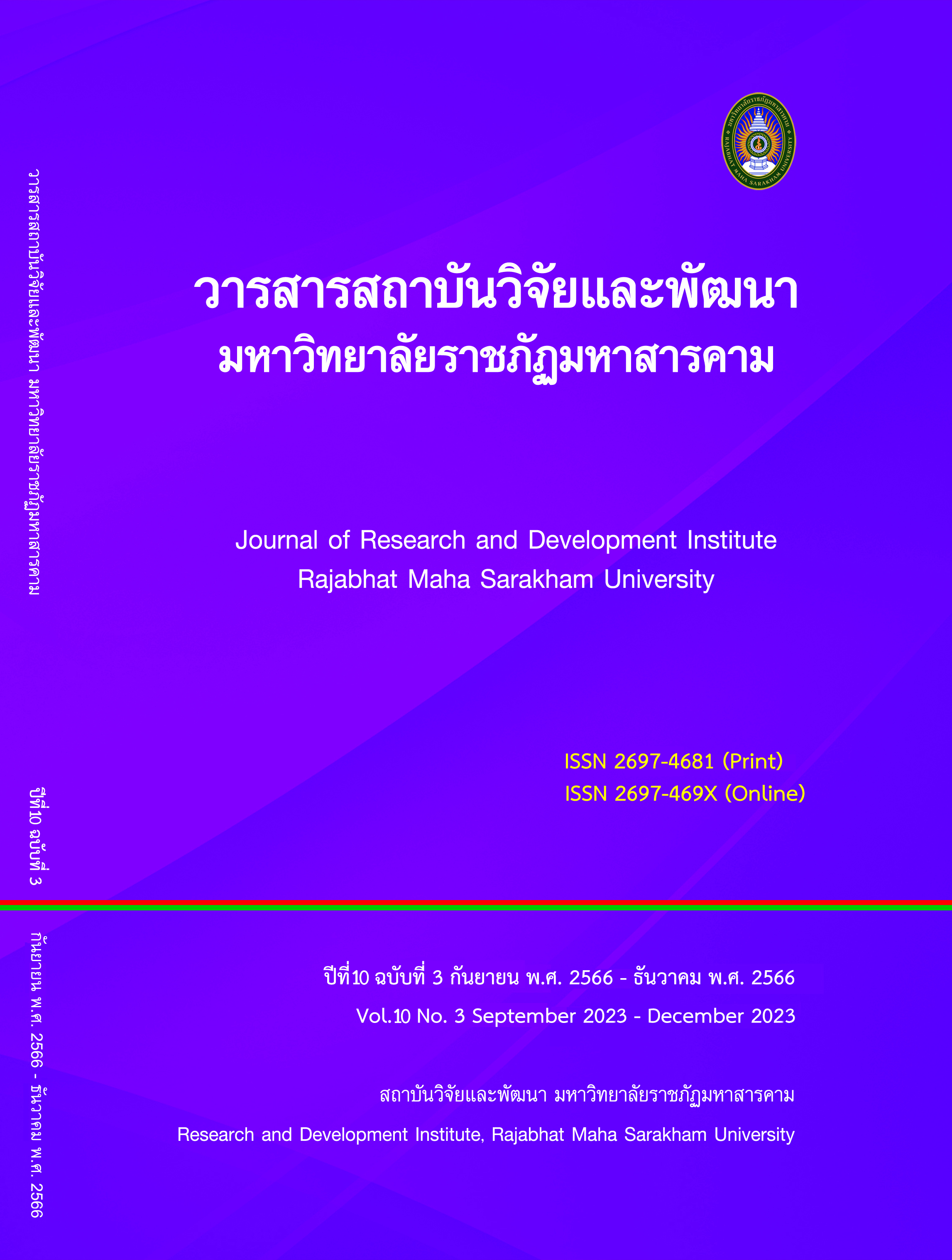DEVELOPMENT OF SCIENCE LEARNING ACHIEVEMENT AND ANALYTICAL THINKING FOR 3RD-YEAR HIGH SCHOOL STUDENTS BY CONSTRUCTIVIST LEARNING MODEL
Keywords:
Learning achievement, analytical thinking, science learning activities, constructivist theoryAbstract
The purpose of this research is to :1) Finding the effectiveness of learning management according to the constructivist theory of 3rd-year high school students with the efficiency criteria of 80/80. 2) Compare the learning achievement in science of 3rd-year high school students who received instruction based on the constructivist theory with the criterion of 80%. 3) Compare the analytical thinking abilities of 3rd-year elementary school students before and after receiving instruction based on the constructivist theory. 4) study the satisfaction of 3rd-year high school students who received science instruction based on the constructivist theory. The sample group consists of 17 students from the 3rd year of secondary school at Baan Kae Witthayakom School, second semester of the academic year 2022. The students were selected using a Cluster Random Sampling method. The research tools used include: 1) management plan based on constructivist theory, 2) Measurement of learning achievement performance test, 3) Measurement of analytical thinking abilities, and 4) Satisfaction questionnaire. The statistical analysis employed includes mean, standard deviation, percentage, and t-tests (One Sample, Dependent Samples)
The research findings revealed that 1) The efficiency of organizing science learning activities according to the constructivist theory by 3rd-year high school students is 86.27/83.53, which is higher than the established criteria. 2) 3rd-year high school students have achieved statistically significant higher learning achievement in science with a percentage higher than 80, at a significance level of .05. 3) 3rd-year high school students have significantly higher analytical thinking abilities after studying compared to before, at a significance level of .05. 4) 3rd-year high school students who have studied through science learning activities based on the constructivist theory are generally highly satisfied.
References
Ban Kae Witthayakom School (2021). Self-Evaluation Report of the Educational Institution for the Academic Year 2021. Kalasin: Ban Kae Witthayakom School.
Bloom, B.S. (1956). Humam Characteristies and School Learning. New York: McGraw-Hill.
Driver, R., & Oldham, V. (1986). A Constructivist approach to curriculum development in science. Studies in Science Education, 13(1), 105–122.
Jaitiang, A. (2003). Learning Management Techniques: Towards Developing Thinking Processes (4th ed.). Bangkok: Praphim.
Karakul, R. (2016). The Development of Science Activity PackagesBased on Constructivist Theory for Mathayomsuksa 4 . Master's Thesis, Mahasarakham University: Mahasarakham University.
Leehamon, J, (2016).The eflects of learning by constructivist concept to analytical thinking and leamning achievement of Mathayomsuksa Sasanuphatham School.Science Education.Ramkhamhaeng University.
Ministry of Education. (2008). Basic education core curriculum B.E. 2008 (A.D. 2008). Kurusapa Printing Ladphrao. (in Thai)
Panya, P. (2015). Measurement and Group Referenced Testing. Mahasarakham
Phanmani, A. (2014). Training to Think Creatively. Bangkok : Chulalongkorn University Press.
Pornpeerachon, P. (2007). Learning Process Organization. Songkhla: Temkarap Songkhla Press.
Sarathan, P. (2016). Study of Learning Effectiveness: Attitudes towards Chemistry and Students' Achievement in the Topic of Renewable Energy, Biomass Combustion, and Products of Grade 6 Students through Constructivist Teaching Approach. Master's thesis, Science Education Program, Mahidol University, 24-25
Downloads
Published
How to Cite
Issue
Section
License
Copyright (c) 2023 สุภาพร บัวผัน, ภูษิต บุญทองเถิง

This work is licensed under a Creative Commons Attribution-NonCommercial-NoDerivatives 4.0 International License.
Articles that are published are copyrighted by the authors of the articles







